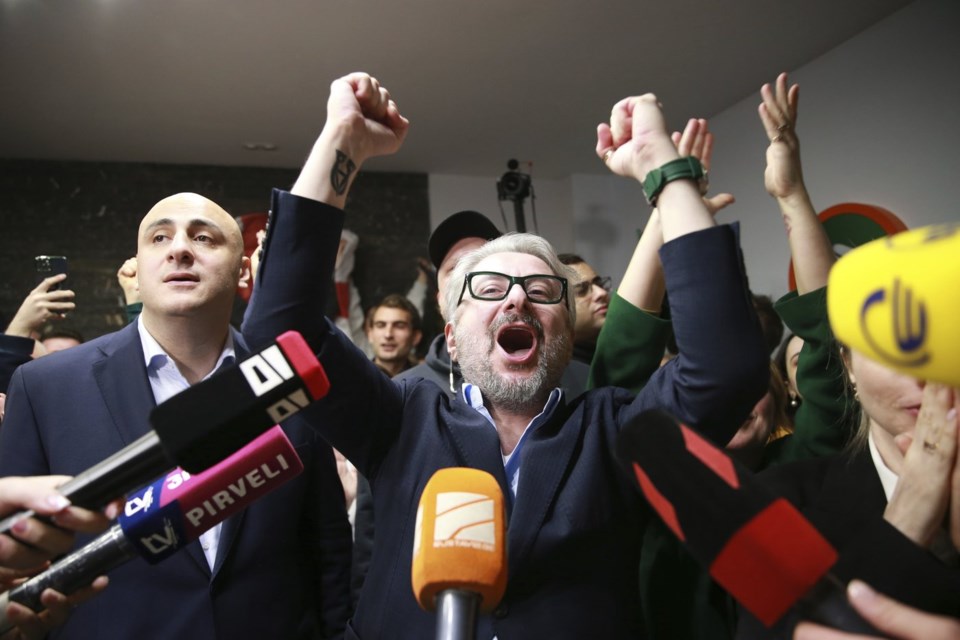TBILISI, Georgia (AP) — Georgia's ruling party is leading the official results of Saturday's parliamentary election, a crucial vote which could decide the country's future in Europe.
Georgia's Central Election Commission said the ruling Georgian Dream party won 52.99% of the vote with just over two-thirds of the vote counted. Not all paper ballots and votes cast by Georgians abroad have been counted.
Bidzina Ivanishvili, the founder of Georgian Dream, claimed victory almost immediately after polls closed and said, "It is rare in the world for the same party to achieve such success in such a difficult situation.”
Earlier Saturday, opposition parties claimed victory when competing exit polls were released.
If Georgian Dream's win is confirmed, it will have a parliamentary majority which will stoke fears about the country’s bid for EU membership.
Brussels suspended Georgia's membership process after Georgian Dream passed laws cracking down on freedom of speech.
Many Georgians viewed the vote as a make-or-break referendum on the opportunity to join the European Union.
The pre-election campaign in the South Caucasus nation of 3.7 million people which borders Russia was dominated by foreign policy and marked by a bitter fight for votes and allegations of a smear campaign. The outcome will determine whether Georgia gets back on track to EU membership or embraces authoritarianism and falls into Russia’s orbit.
Some Georgians complained of intimidation and being pressured to vote for Georgian Dream, while the opposition accused the party of carrying out a “hybrid war” against its citizens.
The biggest opposition party, United National Movement, said its headquarters came under attack on polling day. Georgian media also reported two people were hospitalized after being attacked outside polling stations, one in the city of Zugdidi, the other in Marneuli, a town south of the capital, Tbilisi.
There were also reports of voting irregularities.
A video shared on social media Saturday also showed a man stuffing ballots into a box at a polling station in Marneuli. Georgia’s Interior Ministry said it launched an investigation and the Central Election Commission said a criminal case had been opened and that all results from the polling station would be declared invalid.
Georgian Dream says it will ban opposition parties
Ahead of the parliamentary election, Bidzina Ivanishvili — a shadowy billionaire who set up Georgian Dream and made his fortune in Russia — vowed again to ban opposition parties should his party win.
Georgian Dream will hold opposition parties “fully accountable under the full force of the law” for “war crimes” committed against the people of Georgia, Ivanishvili said at a pro-government rally in Tbilisi, Wednesday. He did not explain what crimes he believes the opposition has committed.
Many believed the election was the most crucial vote since Georgia gained independence following the collapse of the Soviet Union in 1991. Georgian President Salome Zourabichvili described it as an “existential election.”
Georgians want “European integration, want to move forward and want policies which will bring us a better, more stable, future,” Qristine Tordia, 29, told The Associated Press shortly after voting in Tbilisi.
Around 80% of Georgians favor joining the EU, according to polls, and the country’s constitution obliges its leaders to pursue membership in that bloc and NATO.
But Brussels put Georgia’s bid for entry to the EU on hold indefinitely after the ruling party passed a “Russian law” cracking down on freedom of speech in June. Many Georgians fear the party is dragging the country toward authoritarianism and killing off hopes it could join the EU.
The election is "not just about changing government, it is about whether Georgia survives or not because Ivanishvili’s government means Russia,” said Nika Gvaramia, leader of Coalition for Changes, an opposition group.
Ivanishvili voted Saturday morning under heavy security. He did not respond when asked by the AP if he wanted to form an alliance with Russia.
He said the election is a choice between a “government that will serve you,” or “choosing agents of a foreign country which will fulfill the requests of the foreign country only." Ivanishvili did not indicate which country he was referring to but ahead of the election he and his officials claimed a “Global War Party” was seeking to influence the EU and the U.S., widen the conflict in Ukraine, and force Georgian Dream from power.
Opposition backs plan for reforms required by the EU
The vote will see Georgians elect 150 lawmakers from 18 parties. If no party wins the 76 seats required to form a government for a four-year term, the president will invite the largest party to form a coalition.
The opposition parties have ignored Zourabichvili’s request to unite into a single party but have signed up to her “charter” to carry out the reforms required by the EU to join.
Georgian Dream took out billboards across the country contrasting black-and-white images of destruction in Ukraine with colorful images of life in Georgia alongside the slogan, “Say no to war — choose peace.”
The governing and opposition parties told voters they would pursue EU membership even though laws passed by Georgian Dream have put that hope on hold.
At the EU summit last week, EU leaders said they have “serious concerns regarding the course of action taken by the Georgian government."
Georgian Dream stood against three coalitions: the Unity National Movement, the Coalition for Changes Lelo, and Strong Georgia.
The Gakharia for Georgia party, set up by former prime minister Giorgi Gakharia, said it will not go into an alliance with anyone but will support the opposition to form a government if they win enough votes.
——
Associated Press producer Sophiko Megrelidze contributed to this report
Emma Burrows, The Associated Press



